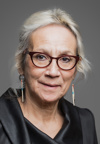SENATORS’ STATEMENTS — A Life in Retrospect
October 3, 2023
Honourable senators, I would like to thank the Progressive Senate Group for giving me their spot today. I want to share with you a small part of the speech I gave at the Winnipeg Art Gallery on September 30 of this year. It was entitled “A Life in Retrospect: Examining the Seven Generations of My Lived Experience.” I’m sharing the second generation — age one to five — at home on the land before residential school.
My people knew where they belonged: on the land — aski. Aski is where our cultures, communities and etinewak rooted themselves and gave themselves definition. Instead of rooting themselves in one particular place, as we do in cities and towns, they travelled aski to follow the food, accommodating their lifestyle to the environment and seasons, as well as where they lived their everyday lives. Each geographical space we settled in became imbued with meaning. All environments were seen as a living place and the ideal location for living, and we left it virtually untouched. These places were not something that we — humans — made, and these places were influenced by non‑human actors. Our relatives — the birds, animals, insects, fish and ecosystem — occupied aski, and played a huge role in the continual shaping and evolution of our culture. In effect, the land was occupied, but the newcomers didn’t see it that way. They saw it as empty.
Aski is meaningful to me. She gives me life. We cannot bind her nor make borders to own her. As cultural groups, First Nations defined themselves, their governance and their code of ethics from the places they lived out on the land since time immemorial. We carry this notion of home in our collective blood memory — free to live out on the land, educating ourselves as we, the children, watched our parents live out the traditions and life skills so we could become independent, but also interdependent, to take our place and honour our purpose in this earth world. Growth not only involved the physical and mental, but also the intellectual and spiritual. This is how I came to know and understand myself. I was able to exercise the creativity, and the curiosity, I had. There’s no place like home out on the land. I was at home with my people’s history — stories of trapping, and my ancestors living out their lives in their own time, in their own way, in the vast aski.
Thank you. Kinanâskomitin.

